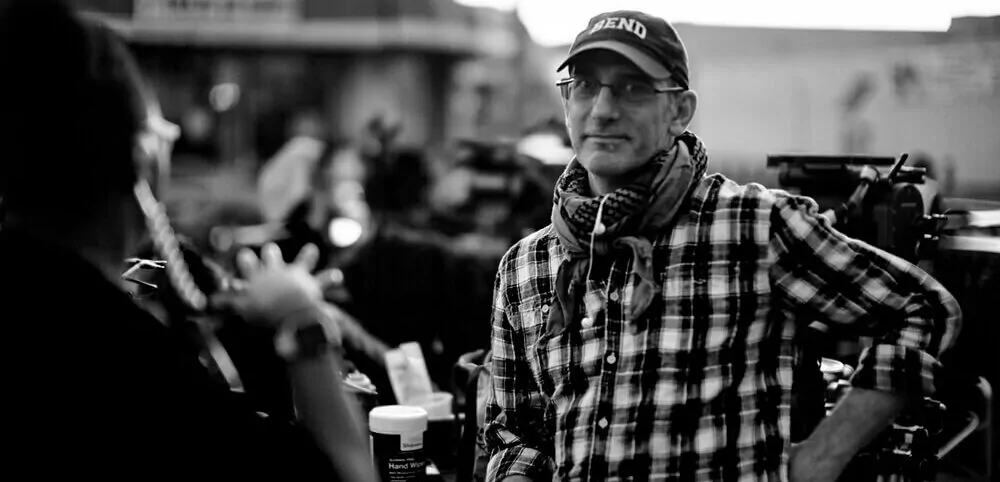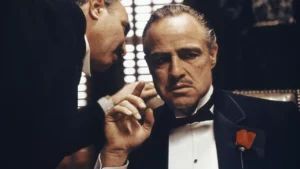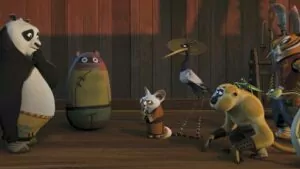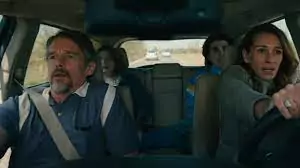DATE : 7TH OF FEBRUARY

Giovani Lampassi is an acclaimed cinematographer having shot both Films and TV in a wide variety throughout the years. The Movie Culture happens to talk to Giovani Lampassi about various aspects of his career, we look back at his start and present day as well as learn few tips on not just cinematography, but directing and production along the way.
Hello and welcome to this interview. We would like to just ask you, how are you doing in this pandemic? And we hope you obviously hope you’re doing fine as we ask.
Giovani Lampassi: Yeah, no, I’m doing well. My family is doing well. We’ve been we’ve been sort of locked down, not officially locked down, but we’ve been this year in our house for a year now. You know, I think at one point was it that it really, really started for the US? I think it was probably April. Just shy of a year. But it’s been it’s been OK. You know, we’ve been we’re all healthy, and that’s important.
Q. Brooklyn Nine Nine, which has garnered a lot of fan base, and you are one of the most frequent, cinematographer’s of that show. So may I ask how you got involved with the show and what’s the story behind it?
Giovani Lampassi: So I had tried to meet with Dan Goor when he was shooting the pilot, but they had a different director and that director had his own cinematographer to shoot the pilot. So I went to Atlanta, Georgia, and I was shooting a feature with Robin Williams. And it was his last movie that he did. And when I was on that show, Brooklyn nine nine had gotten picked up and the cinematographer did. The pilot wasn’t going to do the series because he’s more of a feature cameraman. And so they contacted me and we did an interview while I was in Georgia on a decision call. And they hired me to do to do the show. And then I went back to when I got done with the feature, I went back to Los Angeles and met with them in person. And I hadn’t seen the pilot. I didn’t know what the style of the show was. I had read the script for the pilot because I had gotten that. So I had a I knew that it was a cop show. But immediately when I saw the pilot, I thought that it was a modern day. Barney Miller, if you’re familiar with that show from the 70s, you know.
Q. So you were a cinematographer and know in a room full of people you want the visual guides. And my question was how the procedure from script to screen is? How do you visualize the words and then converted into a visual format?
Giovani Lampassi: Yeah, it’s an interesting question. It’s really, you know, the first time I read the script a couple of times and as you’re reading the script, certain visual images will come to mind, colors, spaces, how light plays in a room, you know, and that difference between comedies and dramas. I always try and light my comedies a little bit more dramatic than normal. Normally would be lit. And I try and it’s you have to play a little sleight of hand with the executives at the network because a lot of times they want it to be bright and cheery. And as a cinematographer, you want to try and give it a look and give it a style and things like that. So I really sort of start looking at the script, not only with the words that the characters will say, but also the action lines and the script scene descriptions. You know, the writers will sort of clue you into what their feeling is and you try and interpret that into what you know, how you visualize it. Then from there, what I start doing is I start looking for reference images online, something that catches my eye. You know, a lot of times I will I will I immediately have an image in my mind and I will oftentimes become really obsessed with finding that exact image so that then I can, in Photoshop or whatever, manipulate the color or the contrast and try and get it to what I’m visualizing. So that’s really that’s really where it starts. And then if you have the opportunity to talk to a director who’s already on board or a producer, you can have a conversation with them about what you know, what their expectations are. You know, obviously, a half hour comedy for NBC is not going to have the aspirations to make it look like something Roger Deakins is doing. You know, but there is oftentimes like, oh, we really like this look from this movie. And it’s like, OK, well, you’re you know, we’re not that far apart with what I visualized and what you’re saying. So now I can kind of bring that together because ultimately the job of the cinematographer is to give the producer and the network, whoever that may be, that book that they want. I mean, if push comes to shove, you’re an artist and you want to do good work, but you’re really, you know, producing a product for a company. And that’s one thing that you have to keep in mind is that you are producing a product like you spoke about working with a director producer.
Q. So, I mean, there has been a lot of name directors like Steven Spielberg who has that one iconic image in all of these movies. As a cinematographer, do you also have this one iconic shot that you just want in your work?
Giovani Lampassi: Yeah, it’s interesting. I really love Wes Anderson with the things he does with his friends and you’ll notice a lot of Brooklyn, the stuff that I’ve shot. I try and do things very, very symmetrical and stuff like that. We would oftentimes. We’d be setting up a shot and I would tell the camera operator, make this Wes Anderson, you know, and then he would now like, you know, if there’s two deaths, make it so that it’s a tableau, you know, and then other times that we would say stuff like, OK, you make us the Breaking Bad shot and we would do something big in the foreground. And, you know, we would we would try and play like that. So, yeah, there is definitely I’m really drawn towards perfectly symmetrical things, you know, where it’s the frame is very well composed and that can be oftentimes really challenging and a handheld show like what we did. So it would be like starting with that and then moving, you know.
Q. So you have been a director as well directing Episodes on Brooklyn Nine-Nine, what do you prefer more, Cinematography or Directing?
Giovani Lampassi: Yeah, I love I love cinematography. But the ultimate goal when I was young and I wanted to get in the business was I wanted to be a director, writer, producer and coming up through the lighting department like I did, I worked my way up as a as a set technician. I became a chief lighting technician. Then I became a director of photography. And I feel like those tools really made me when I do direct. I also graduated with a double major in English and education, and I feel like directing and even as a director of photography, the ability that I have from my education background to communicate what the ideas are that I’m trying to accomplish, either through the camera or when I’m directing with with talent, those all are part of my toolbox that I bring into set. So ultimately, you know, the next while I’m still a cinematographer and I need to pay the bills and I need to work, the next phase of my career, I’m hoping will be directing and producing. And I do a little bit of writing a I run a script like there’s a. Website here in the States called Get It Made that helps screenwriters. Make their screen writing better and their product better, and I am one of the resident professionals that work with we call them I call them baby writers; they’re writers who haven’t produced anything yet. And I work with them with their screenplays. So I love screenwriting. I love directing and producing. And that’s one of the reasons we couldn’t do the interview yesterday is Friday night. I had directed a proof of concept for a feature film and that was an all night shoot that. Yesterday was a production hangover. I was really, you know, sleep deprived yesterday.
Q. The next question, you’ve been working in the industry for a long time from the 90s. And, now we’re in the golden age of technology. So the question was how much difference have you spotted or what’s the key difference between making movies then and making movies now?
Giovani Lampassi: Yeah, it’s interesting when I first started, there was a you know, we were shooting on film, there was you know, there were obviously video cameras, but they were mostly for television news and things like that. When a cinematographer on set would do something, light a set and then shoot it, you know, we you couldn’t see other than a little monitor with that resolution, you couldn’t see what the cinematographer visualized and how they chemically created that image until twenty four hours later after the film had gone to the lab and processed dailies have been printed. And then it comes back and you couldn’t even watch them unless you went to the screening room. So there is a little bit of magic that the cinematographer would do. Nowadays, when anybody walks by the monitor that the director that the cinematographer is working at, they see immediately what that image is. And everybody has an iPhone and a Smartphone and they’re able to record images. So there’s been a blessing and a curse with what has happened. The blessing is, is that moviemaking is more accessible. Anybody can do it, you know, and to me, I don’t care what the camera is that you’re shooting with, whether it’s an Alexa, whether it’s a red or it’s your iPhone, you can make a story. You know, you can make a film. And really, the heart of a film is a story. You’re telling a story through visual images. So as long as those visual images incite some kind of feeling and some kind of reaction from the audience, then you’ve accomplished your goal. The downside of that is, is that there’s a lot of people who may call themselves a cinematographer or director of photography and. They are accomplishing creating a visual image, but we always say a bunch of my friends, when we all get together, we’re like anybody can point the camera in the right direction. But when everything has gone wrong and your life break down or something has happened on set and now you only have five minutes to shoot something that would normally take three hours. That’s when being able to pull on all of the experience and all of the knowledge. You have a system that really comes into play. And I’m not saying that young cinematographers can’t do those things and be inventive, but I’m saying that, you know, that there is a skill set that is that you need to have to really become that director of photography or cinematographer, whatever you want to call yourself. And I think that that finding those people who do excel in those things is they’re the ones who are truly cinematographers. Does that make sense?
Q. To follow up on the Previous Question that if you were to direct a fashion project and a big, large claim that you so wanted to direct a lot of things and now you’ll find anything, would you choose to do it on film or digital?
Giovani Lampassi: I think I would choose digital nowadays. I mean, we’ve come so far, I think, you know, going back to film has a certain look, but you’re still able to achieve that look in digital and the way the cameras are nowadays, they’re much more sensitive, you know, in dark situations than film could have been back in the day. I mean, you know, 500 ISO was the best that Kodak had to offer Fuji. And, you know, when I shot on Friday night, we were shooting at thirty two hundred or so. So we were able to use the streetlights as real light sources. You know, before when you shot a film, you would you would see the light source of the street light and you would get a pool of light. But nowadays you can really make it your key light if you’re inventive and if you know how to block the action correctly and make it attractive enough. So and I love being able to use the environment as. The light sources, because it’s just so natural, you know?
Q. There’s this one question which I always have while watching the TV series, because after the break, you know that there’s a different director in place. The whole team behind the scenes is different. But the only constant is the actors. And you’ve done a lot of TV. So the question was, how do you streamline the things which are producing? Because a lot of a lot of cinematographers and you being one of them, how do you walk amongst you all?
Giovani Lampassi: Well, there’s been several times where I’ve taken shows over, Up all Night for NBC was one of them where Matt Clark was the DP. He left the show and I took over. So a lot of times people are afraid when a new cinematographer comes in, because even though I love the look of all night, Christina needed to be let in a certain way. She you know, she’s a very beautiful woman. But Matt had had let her a certain way and she had grown accustomed to that. And even though I wanted to keep the look the same. The tools that I would naturally call on to create that same look may be slightly different. So even in your heart, if you’re trying to keep the look the same, it’s always going to be just a little bit different. But I think that I always call that upon myself as a personal challenge. Like, I don’t want people to know that there’s been a different cinematographer. I love being able to be so adaptable that nobody notices. It’s like, you know, because I think I’m the man behind the curtain where, you know, you shouldn’t see me pulling the levers, you know? And that’s one of the problems I have with some cinematography is, you know, they’ll do a shot or they’ll do some kind of lighting. And it’s like, well, that’s just really because that cinematographer wanted everybody to say, hey, it’s me behind the camera, you know? And that to me, you know, I mean, its fine whatever they want to do with their artistic choice. But I look at some of those sometimes and I’m like, did you really have to do, you know, like, really did you have to do that? So does that answer your question about trying to maintain? Look, I mean, sometimes they do want to depart from the look. And the question is, how can you keep the essence of the tone of the show the same? But I bring it up to speed or, you know, modernize it or give it a different spin so that it accomplishes what the producer’s goals are. I don’t know if that answers your question. So it’s an individualistic choice. You’re trying to say.
Q. Yeah, I mean, who are the people who have the final say in creating the other creativity?
Giovani Lampassi: The creator/the show runner, On Brooklyn Nine Nine, that’s Dan. Dan has a sort of a hands off approach when it comes to the cinematography. I think that he likes what he sees when he sees something. And there are certain things that I think Dan reacts to in the editing room when something doesn’t work in terms of shot structure or that kind of stuff, more than the lighting aspect of things is pretty open to that. One of the producers who’s one of the most creative producers ever work. And Matt, no doubt he was much more involved with the look of the show from a cinematography point of view. And I would always go to Matt. I would say, hey, I want to shoot this super slow motion. And he would you know, he would he would ninety five percent of the time be very, very supportive and encouraging. And then five percent of the time it would be. I love your idea, but we don’t have the time to accomplish that in this episode, so let’s talk about it for another episode. You know, it’d be one of those kinds of things, but most of the time is very open and supportive to creative cinematography.
Q. Everyone is very proud of their artistic choices and what they’ve done artistically. So are you someone who pays attention to critics or do you do you think that they are just tools which you just have to ignore?
Giovani Lampassi: On Brooklyn Nine Nine, we would look into it, the ratings and stuff like that, because for a long time, especially here on Fox, we would struggle because we didn’t really get that pull that we needed to become a hit show when we were there. So we would always look and see what they what they wrote about, because it’s interesting getting their take on how they view. The storylines, and very seldom do TV critics ever comment on what the show looks like, you know, that’s an afterthought, I think. But it would be interesting because a lot of times when we would be shooting a show, we would say, oh, there’s a problem with the storyline, you know, like we would recognize it on set like that, you know, and then the critics would say the C story didn’t make any sense or, you know, and it would almost be validation, like, yeah, we knew that there was a problem and there it is. You know, there’s so yeah. So we do we do, you know, read some reviews and things like that, especially if it’s an episode that we either loved or hated because there were episodes that we truly hated and we were like, this is the worst thing we’ve ever done. You know, that happens.
Q. Any future projects you would like to share with us?
Giovani Lampassi: No, I don’t have anything. Yeah, things are things have been really weird this year especially I mean, there’s been a stutter steps. You know, even the guys, the people in Brooklyn, they started shooting some stuff right before Thanksgiving or after Thanksgiving. And now it’s shut down again, because here in Los Angeles, we have so much comedy. I think technically we weren’t even really supposed to be shooting on Friday night, but we were it was just such a small thing that we were able to sneak and do it. But, yeah, there’s been it’s so we’re starting to. To get some interviews, some things happening for shows that are going to hopefully start up in February and I don’t really have anything yet for you for the upcoming months, so I’m hoping to get something. And it’s always like a superstition that you don’t want to talk about anything that you may be up for.
Q. So we are situated in India and there’s a big Bollywood industry, which we have. And the look of Bollywood production is a lot different. There are different colors and in Hollywood it’s muted. So as a cinematographer, have you seen any Bollywood projects or have you been inspired to bring all the same changes in Hollywood?
Giovani Lampassi: I don’t have much experience in Bollywood projects. I think I’ve seen a couple, but I’ve never I have not been a big viewer of the Bollywood stuff. I can’t because you guys do a lot of musical numbers and dancing and stuff like that, and that’s something that I stay away from. Like I started watching even art if you see in La La land. So I watched the first five minutes of in La La land and turned it off because I just can’t I, I don’t really, I don’t like musical numbers and things like that to me. It’s just not, it’s not something that I’m interested in. So I think that. I for that reason, because I know that there’s a lot of that in Hollywood movies that I am not interested in, and part of that is, you know, it’s my it’s my own it’s my own take on how humans react to situations like drama. And I always say, and this is me being a wise ass, I always say that if I ever see anybody come out of their house and see that their dog has been hit by a car and then they break into song, then I’ll start watching musicals. But I just don’t believe that anybody at their lowest moment in their life is going to break out and do a song. So that’s why, you know, for me, it’s far fetched. And it’s funny because I’m not a huge Star Wars fan, but like I watch Star Wars. And that, to me is just as ludicrous and ridiculous as the other scenario, you know, so it’s just you sort of pick the things that you’re willing to go for, you know, and that’s where I’m at.
Q. OK, to close out this interview, going with the cliché route, what kind of advice would you give to aspiring Cinematographers?
Giovani Lampassi: Well, yeah, I always tell. So there are a lot of things I think that the most important thing coming from cinematography is that you understand what a story is. So I always tell people who want to be cinematography. I tell them two things study, literature and writing. You should be taking creative writing classes and you should be studying literature. The other thing the third thing is that you should be studying great works of art, everything back to the Renaissance. You know how artists interpret light. And I loved when I was coming up. I would love looking at Edward Hopper’s paintings because the way that he dealt with life is just his urban paintings were amazing. The other thing is there’s a great book by Ansel Adams called The Negatives, and he talks about how to expose the negative. And even though we don’t work on cellular, you know, celluloid anymore, you’re still exposing on the censor the same way you would in film. And his book is something I would reread every single year for the first 10 years of my career. I should probably go back and reread it again. But he talks about the zone system. He talks about how light, you know, falls. And his book is really amazing. I also love people who are interested in cinematography to watch Visions of Light, which is a great documentary about cinematographers. And I love that documentary because it the first part of it is the cinematographers talking about what films influenced them, what made them get interested in cinematography. And then the second half of the documentary, they talk about their own work. So I think it’s interesting to see how a cinematographer thinks about, you know, I mean, everybody is influenced by things for me. Derris Congi directed it was a cinematographer on seven, and that when I was early in my career was an amazing impact with what he did with that film. So I think that those things are important. Then obviously, you know, if you’re interested in becoming a cinematographer, you probably watch a lot of film and watching, you know, as much as film as you can. It is important. And seeing how people not only work with light, but how they move the camera, how they move the actors and learning that language is very, very important.
The Movie Culture Synopsis
That was a fun talk regarding Cinematography, never have I seen cinema in a painting but Giovani Lampassi managed to make a point out of that as well. It was also interesting to speak about Brooklyn Nine-Nine and how the production was managed there when the show was at Fox.
Lampassi’s love for Coen Brother like cinematography is certainly fascinating and yet his dislike of Musicals can be hard to admit. One crucial thing we also discovered that Giovani Lampassi isn’t just a cinematographer but he works on writing and directing. Heading up an Initiative called Get It Made. It wouldn’t be a difficult process to find Giovani Lampassi’s work as it can be easily found on Brooklyn Nine-Nine.




